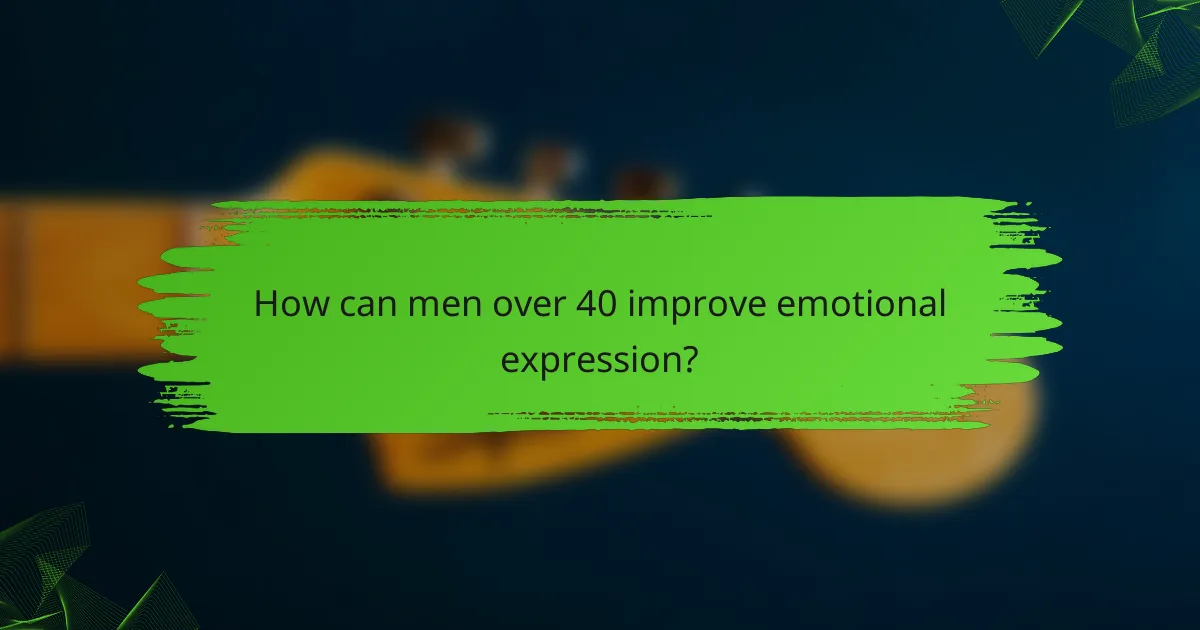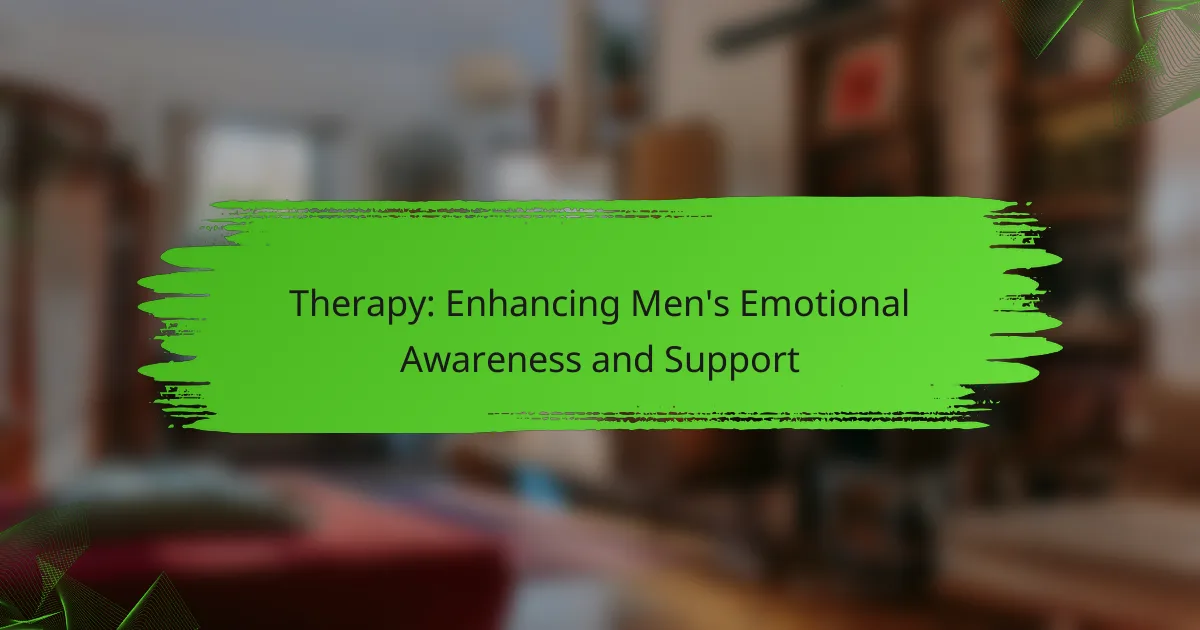Men over 40 often encounter significant barriers to emotional expression, influenced by societal expectations and personal fears. These challenges can affect their relationships and overall mental health, making it crucial to explore effective strategies for improving communication and emotional well-being.

What are the emotional expression challenges for men over 40?
Men over 40 often face significant challenges in emotional expression, stemming from a combination of societal pressures, personal fears, and cultural norms. These barriers can hinder their ability to communicate feelings effectively, impacting relationships and overall well-being.
Societal expectations
Societal expectations often dictate that men should be stoic and emotionally reserved, especially as they age. This pressure can lead to feelings of inadequacy when they struggle to conform to these ideals, making it difficult for them to express emotions openly.
Many men may feel that showing vulnerability is a sign of weakness, which can prevent them from seeking help or sharing their feelings. This can result in isolation and increased stress, as they grapple with emotions internally rather than discussing them.
Fear of vulnerability
The fear of vulnerability is a significant barrier for many men over 40. This fear can stem from past experiences where emotional openness led to negative outcomes, such as rejection or ridicule. As a result, they may choose to suppress their feelings to avoid potential pain.
To combat this fear, men can practice small acts of vulnerability in safe environments, such as sharing thoughts with trusted friends or family members. Gradually opening up can help build confidence in expressing emotions without fear of judgment.
Cultural norms
Cultural norms play a crucial role in shaping how men perceive emotional expression. In many cultures, traditional masculinity emphasizes traits like toughness and independence, discouraging emotional sharing. This can create a conflict for men who wish to express their feelings but feel constrained by these norms.
To navigate these cultural barriers, men can seek out supportive communities or groups that encourage emotional expression. Engaging in activities that promote emotional intelligence, such as workshops or therapy, can also help challenge and reshape these ingrained beliefs.

How can men over 40 improve emotional expression?
Men over 40 can enhance their emotional expression by actively engaging in therapy, joining support groups, and practicing mindfulness. These approaches provide practical tools and environments that encourage open communication and self-reflection.
Therapy and counseling
Therapy and counseling offer a structured space for men to explore their emotions with a professional. Individual or group therapy can help identify emotional barriers and develop strategies for better expression. Many therapists specialize in working with men and can tailor their approach to address specific challenges faced by this age group.
Consider seeking therapists who use cognitive-behavioral techniques or those who focus on emotional intelligence. Sessions typically last 45-60 minutes and can be weekly or bi-weekly, depending on individual needs.
Support groups
Support groups provide a community of peers who share similar experiences, fostering a sense of belonging and understanding. These groups often focus on specific themes, such as grief, relationships, or stress management, allowing men to express their feelings in a safe environment.
Look for local support groups through community centers or online platforms. Many groups meet regularly, and participation can range from casual attendance to more committed involvement, depending on personal comfort levels.
Mindfulness practices
Mindfulness practices, such as meditation and yoga, can significantly improve emotional awareness and expression. These techniques encourage men to tune into their thoughts and feelings without judgment, promoting a deeper understanding of their emotional landscape.
Start with short daily sessions, gradually increasing the duration as comfort grows. Apps and online resources can guide beginners through mindfulness exercises, making it easier to incorporate these practices into daily life.

What role does physical health play in emotional expression?
Physical health significantly influences emotional expression, particularly for men over 40. Good physical health can enhance mood, reduce stress, and improve overall emotional well-being, making it easier to express feelings openly.
Exercise benefits
Regular exercise is crucial for emotional health, as it releases endorphins that boost mood and reduce anxiety. Activities like walking, jogging, or strength training can help men over 40 manage stress and improve their emotional resilience.
Aim for at least 150 minutes of moderate aerobic activity each week, such as brisk walking or cycling. Incorporating strength training twice a week can further enhance physical and emotional well-being.
Nutrition impact
Nutrition plays a vital role in emotional expression by affecting brain chemistry and mood regulation. A balanced diet rich in fruits, vegetables, whole grains, and lean proteins can support mental health and emotional stability.
Consider incorporating omega-3 fatty acids found in fish, nuts, and seeds, as they are linked to improved mood. Staying hydrated and limiting processed sugars can also contribute to better emotional health.
Sleep quality
Quality sleep is essential for emotional regulation, as it affects cognitive function and mood. Poor sleep can lead to irritability and difficulty expressing emotions, making it crucial for men over 40 to prioritize sleep hygiene.
Strive for 7 to 9 hours of quality sleep each night. Establishing a consistent sleep schedule, creating a restful environment, and avoiding screens before bedtime can enhance sleep quality and emotional expression.

How can relationships affect emotional expression in men over 40?
Relationships significantly influence emotional expression in men over 40 by shaping their comfort levels and communication styles. Supportive relationships can encourage openness, while strained connections may lead to emotional withdrawal.
Communication skills
Effective communication skills are crucial for men over 40 to express their emotions clearly. Many men may struggle with articulating feelings due to societal norms that discourage vulnerability. Practicing active listening and using “I” statements can help convey emotions more effectively.
Men can benefit from engaging in conversations that promote emotional literacy. This includes discussing feelings openly with partners or friends, which can foster a more supportive environment for emotional expression.
Partner support
Supportive partners play a vital role in encouraging emotional expression. When a partner actively listens and validates feelings, it creates a safe space for men to share their emotions without fear of judgment. This support can significantly enhance emotional well-being.
To strengthen this support, couples can establish regular check-ins to discuss feelings and experiences. This practice can help both partners understand each other’s emotional needs better and build a stronger emotional connection.
Friendship dynamics
Friendship dynamics can greatly impact how men express emotions. Close friendships that allow for vulnerability can lead to healthier emotional expression, while superficial friendships may discourage it. Men should seek out friendships that promote openness and honesty.
Engaging in activities that foster deeper connections, such as group discussions or shared hobbies, can enhance emotional expression among friends. Additionally, men should be mindful of the emotional climate within their friend groups, as supportive environments can encourage more authentic sharing of feelings.

What are the barriers to seeking help for emotional expression?
Barriers to seeking help for emotional expression often stem from societal expectations, personal beliefs, and a lack of available resources. Men over 40 may face unique challenges that prevent them from addressing their emotional needs effectively.
Stigma around mental health
The stigma surrounding mental health can significantly hinder men from seeking help for emotional expression. Many men feel pressured to conform to traditional masculine norms, which often discourage vulnerability and emotional openness.
This stigma can manifest in various ways, such as fear of judgment from peers or concerns about being perceived as weak. As a result, men may avoid discussing their feelings or seeking professional support, leading to unresolved emotional issues.
Lack of resources
A lack of resources can further complicate the process of seeking help for emotional expression. In many areas, access to mental health services may be limited, particularly for older men who may not be aware of available options.
Financial constraints can also play a role, as therapy or counseling can be costly, and insurance coverage may not always include mental health services. Men should explore community resources, support groups, or online platforms that offer affordable options for emotional support.



